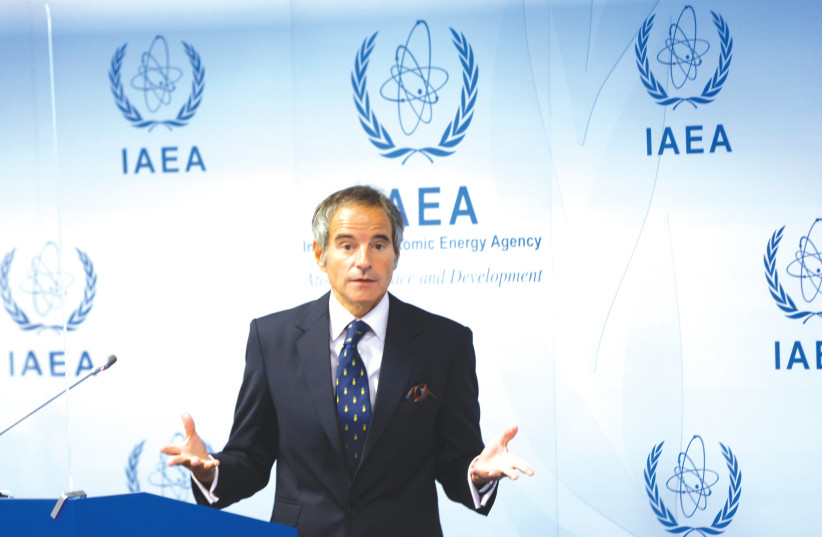The International Atomic Energy Agency and Iran agreed on Saturday to a roadmap to resolve outstanding issues in the agency’s probe of Tehran’s nuclear program, in a development that could pave the road to a broader deal with the world powers.
According to the roadmap, Iran will provide new information to the world’s nuclear inspectors by March 20, followed by a series of exchanges and meetings which may end with closing the probe at the IAEA Board of Governors meeting in June.
Yet, in a dizzying development, the same day the IAEA deal was announced, Russia suddenly threatened to obstruct the ongoing nuclear talks with the Islamic Republic in Vienna.
Since the Mossad seized Iran’s secret nuclear archive in January 2018, the nuclear agency and the ayatollahs have faced a series of conflicts over questions about four nuclear sites that Iran had kept secret and over illicit nuclear material that inspectors found at one of the sites.
A deal closing those probes by late June would seem to energize the broader talks between Iran and the world powers about returning to the 2015 JCPOA nuclear deal in Vienna.

But on Saturday, Moscow suddenly demanded a written US guarantee that Ukraine-related sanctions would not damage Russian cooperation with Iran.
An Iranian official called this threat “not constructive” and said there was speculation about whether it might derail the talks.
“The new Russia-related sanctions are unrelated to the JCPOA and should not have any impact on its implementation," a US State Department spokesperson said.
“We continue to engage with Russia on a return to full implementation of the JCPOA. Russia shares a common interest in ensuring Iran never acquires a nuclear weapon,” said the spokesperson.
Moscow’s activities go to the heart of the JCPOA, including being the default destination to ship out Iran’s uranium stock and because Russia helps operate a variety of Iranian nuclear facilities.
As such, Russia’s threat was not in response to any prior US statement to date indicating that Ukraine sanctions would impact Russia’s relations with Iran, and the entire situation could be simply to get Washington to publicly acknowledge that fact in the ongoing public relations war with Moscow.
“Russians had put this demand on the table [at the Vienna talks] since two days ago. There is an understanding that by changing its position in Vienna talks, Russia wants to secure its interests in other places. This move is not constructive for Vienna nuclear talks,” said the Iranian official in Tehran.
Demanding written US guarantees that Western sanctions imposed on Russia over the conflict in Ukraine would not damage its cooperation with Iran, Russian Foreign Minister Sergei Lavrov said the limitations had become a stumbling block for the Iran nuclear deal, warning the West that Russian national interests would have to be taken into account.
Lavrov said the sanctions on Russia over the conflict in Ukraine had created a “problem” from Moscow’s perspective.
When asked whether Russia’s demand would harm 11 months of talks between Tehran and world powers, including Russia, Iran project director at International Crisis Group, Ali Vaez said, “Not yet, but it’s impossible to segregate the two crises for much longer.
“The US can issue waivers for the work related to the transfer of excess fissile material to Russia. But it’s a sign that the commingling of the two issues has started,” Vaez said.
Two diplomats, one of them not directly involved in the talks, said China also has demanded written guarantees that its companies doing business in Iran wouldn’t be affected by US sanctions.
Earlier Saturday, Iran’s nuclear chief Mohammad Eslami told a joint news conference with IAEA chief Rafael Grossi that “We have agreed to provide the IAEA by [the Islamic month of] Khordad [June 21] with documents related to outstanding questions between Tehran and the agency.”
Grossi arrived in Tehran late on Friday to discuss one of the last thorny issues blocking revival of the pact, which in return for a lifting of economic sanctions limited Iran’s enrichment of uranium, makes it harder for Tehran to develop material for nuclear weapons.
At a second solo press conference Saturday night, Grossi revealed that the IAEA was mostly dropping efforts to clarify what Iran had done with an illicit metal disc of nuclear material at one of the four nuclear sites in dispute.
“What we are looking for is not there," Grossi said. "There is no possibility for Iran to prove whether it was re-casted. We never close things. We have our assessment at this point in time. There is no point in continuing this because we are going to be leading nowhere.”
However, when pressed if he might close the probe into the three other nuclear sites based on a similar level of uncertainty, the IAEA chief demurred.
“I don’t think so because of the nature of things," he said. "A discrete and small amount of material is difficult to trace or impossible to trace back... what happened to it almost 20 years ago is completely different from the traces of enriched uranium at a place where no enriched uranium should have been found and information about [potentially illicit] equipment.”
Earlier in the day, Grossi said, “Without resolving these [outstanding] issues, efforts to revive the JCPOA may not be possible,” but later in the day he sounded an optimistic note about trends in talks with the Islamic Republic.
A major sticking point in the talks had been that Tehran wanted the question of uranium traces found at several old but undeclared sites in Iran to be closed. Western powers had said that is a separate matter from the deal, to which the IAEA is not a party.
Also on Thursday, Prime Minister Naftali Bennett spoke to Grossi to emphasize Israel’s stance on all Iran nuclear-related issues.
Omri Nahmias contributed to this report.
